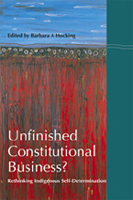Unfinished Constitutional Business? Rethinking Indigenous self-determination
Summary
Indigenous self-determination is the recognised right of all peoples to freely determine their political status, and pursue their economic, social and cultural development. Unfinished constitutional business? offers fresh insights into the ways communities can chart their own course and realise self-determination. Because the history of colonisation is emotionally charged, the issue has been clouded by a rhetoric that has sometimes obstructed analysis.
Unfinished constitutional business? provides a comprehensive international exploration of self-determination. It argues that patterns are emerging that point to effective strategies that will allow communities to realise their goals.
Unfinished constitutional business? surveys both common law and civil law systems. The United Nations working party’s definition of Indigenous people has been influenced by these different experiences of colonisation, as was the Australian High Court decision in the Mabo case; in particular, Justice Brennan’s concept of a sovereign community.
Diverse jurisdictions are examined, from the Saami Parliaments of Scandinavia, to the Maori seats in the New Zealand Parliament to the Canadian experience in territorial governance. Issues that cut across jurisdictions, such as Article 8(j) of the Convention on Biological Diversity are also analysed.
The authors of Unfinished constitutional business? challenge readers to (re)consider the meanings of self-determination and their implications for community development — and to explore what self-determination might be, particularly in Australia.
Reviews and endorsements
'The theme of Indigenous self-determination is evident throughout the articles in this book. It is a collaboration of both Indigenous and non-Indigenous writers with case studies that provide some interesting models of self-determination in settler societies. The case studies are good examples of the continuing struggles by Indigenous people in trying to negotiate with States in the current conservative political climate.
Overall, the book reinforces the idea that Indigenous affairs is '“unfinished business'” and clearly states there is still a long way to go in achieving Indigenous rights to self-determination.’
— Sonia Smallacombe, Charles Darwin University
